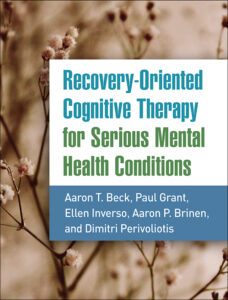By Paul Grant, PhD, and Ellen Inverso, PsyD
Co-Directors, Center for Recovery-Oriented Cognitive Therapy
Recovery-Oriented Cognitive Therapy for Serious Mental Health Conditions, which is now available in paperback or electronically and will be released in hardcover on December 8 by Guilford Press, is a practical new guide to the revolutionary, evidence-based practice of Recovery Oriented Cognitive Therapy (CT-R).

CT-R is grounded in the premise that recovery is possible for all, no matter how long an individual has been experiencing serious challenges or how difficult these challenges appear. Written after nearly two decades of research, development, and implementation, Recovery-Oriented Cognitive Therapy for Serious Mental Health Conditions is the first practical guide that focuses on expanding the reach of CT-R to a greater number of individuals and their caregivers. It is written by the foremost experts in this new field and will leave a lasting impact on the lives and care of individuals with serious mental health conditions.
Originally developed to empower individuals given a diagnosis of schizophrenia, CT-R is highly collaborative, person-centered, strengths-based, and tailored to those who have a history of feeling disconnected from —and distrustful of — mental health professionals. This book provides practical strategies and interventions to promote recovery, resiliency, and empowerment, which extends the reach of CT-R to individuals who have not historically benefited from evidence-based practice.
Based upon the latest science and practice innovations, this book details flexible, generative CT-R strategies and interventions that are broadly applicable across care settings. The practice of CT-R involves using dynamic experiential activities to empower individuals to live the life they desire. This playbook-type guide applies the CT-R approach with individuals given a serious mental health diagnosis across the spectrum of age and severity to a broad range of challenges, including negative symptoms, hallucinations, delusions, communication disturbance, trauma, self-injury, aggression, and substance use. Using case examples, the book helps the reader organize, plan, and execute CT-R strategies and interventions by following the framework of a Recovery Map. Case examples are used throughout the book to illustrate challenges and demonstrate how the approach builds.
This book is written in plain language, making it accessible to the various stakeholders who might engage in this work. The primary audience is anyone involved in the care of individuals with serious mental health conditions: psychologists, nurses, social workers, psychiatrists, and more. The secondary audience includes administrators, families, and affected individuals. The accessible language makes the book suitable for many different education levels and experiences.
Order your copy of Recovery-Oriented Cognitive Therapy for Serious Mental Health Conditions here.
Authors and Co-Directors of the Center for Recovery-Oriented Cognitive Therapy Dr. Paul Grant and Dr. Ellen Inverso will be teaching a workshop on CT-R to Empower Families on December 17. Register here.